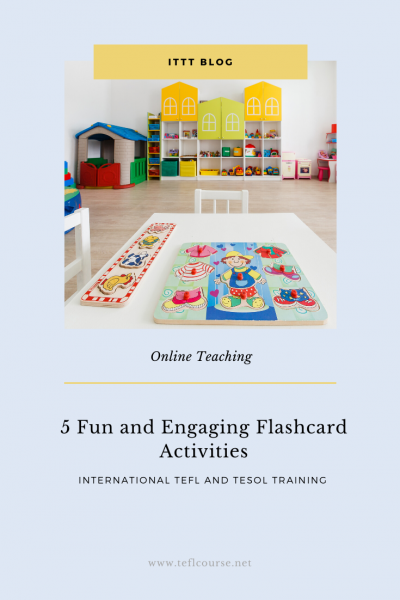5 Fun and Engaging Flashcard Activities

Flashcards are an integral part of teaching English as a second language, and the variety of uses of cards is innumerable. Flashcard-based activities help teachers to make lessons fun, engaging, and therefore more effective. According to numerous studies conducted in different countries, and by various linguists, there are several types of students with varying abilities of memory and types of mind. And usually many of these types are represented within any one class, which leads us to the conclusion that the teacher should address each of them during the lesson.
This post was written by our TEFL certification graduate Stanislav T. Please note that this blog post might not necessarily represent the beliefs or opinions of ITTT.
Reasons to Use Additional Resources
It is difficult to underestimate the importance of using visual materials to teach new words and expressions, especially when it comes to young students. And Flashcards are an excellent example of such visual materials due to interactivity and high visual impact. Flashcards are a handy tool that helps the teacher reach not only visual students but kinaesthetic as well. Usually, while using a dictionary, a student builds up a chain: Object - Meaning (word) in his native language - Meaning in a foreign language.
The present chain can lead to a significant delay in the reaction and understanding of a foreign language. Flashcards are designed to avoid meaning in the native language because they create a different chain: from the object or verb to the definition in a foreign language and only then are associated with the word in the native language. Therefore, the association/meaning in foreign language starts to appear at the same time with the association in mother-tongue and makes a reaction faster and fluency easier to reach.

Also Read: 8 Reasons to Teach English in Thailand | ITTT | TEFL Blog
Examples of Games
Name the Card
- Duration: 5 minutes.
- Purpose: Presentation of new vocabulary/verification of previously learned vocabulary.
- The teacher shows the audience card and asks if anyone knows what is in the picture. The first student to answer receives a point; in the end, the winner gets a prize. If no answer was received or after the student pronounced the correct word, the teacher pronounces/repeats the word and asks the students to repeat it three times out loud. The teacher can show not only the map but also the subject or action. This game is the perfect way to introduce new vocabulary and check vocabulary from previous lessons.
Match up
- Duration: 5 minutes.
- Purpose: to evoke vocabulary and develop reading skills.
- For this game, the teacher needs two sets of flashcards with pictures and text. Depending on the purpose of the lesson, the teacher places cards with text or pictures on the blackboard. Then asks the random student to pick the card from the stack name and put it on the blackboard to make a pair with the flashcard on the board. In case the student has a problem with the answer, ask the class for help. After all the cards are on the board, the teacher can mix them and ask the class to pair the cards again.
Also Read: Can I teach English abroad without a work visa?
Couples
- Duration: 5 - 10 min.
- Purpose: To evoke vocabulary and rise memory abilities.
- For this game, the teacher needs 2 or 4 sets off flashcards with pictures. This game can be played as a team game. Place the cards at the board or on the floor blank side up. And ask the student to turn and name the card, then ask the same student to pick another card and name it. If another card makes a pair with the first one student can take them and gets 2 points if not but the student named the cards correctly the student receives 1 point, if the pair was not created the student turns the cards blank side up and takes his/her seat, and another student gives it a try. The Game comes to an end when all the pairs are formed and named. The game can also be played in teams. The teacher divides the class into two teams each team has its stack of flashcards, the team that makes the pairs faster declared as a winner.

Sort and Name
- Duration: 5 minutes.
- Purpose: To evoke vocabulary.
- For this game, the teacher needs cards with pictures or text — related different subjects or topics, for example, food, clothes, colors, shapes, etc. The teacher divides the blackboard into two parts and asks the student to name and place the card on the proper section of the board. This game can also be played by teams. Each team has its stack of flashcards and sorts them following the task team who finished earlier will be declared as a winner. This game not only helps students to evoke vocabulary but also pushes students to use logic.
Also Read: Should I take a TEFL course online or in a classroom?
Funny steps
- Duration: 5 -10 minutes.
- Purpose: To evoke vocabulary and increase fluency.
- This game can be played individually or in teams. The teacher places flashcards on the floor to form one if played individually or two or more parallel lines for teams. Then explain the students that they have to walk on a side to the cards and each step is a card and they can move to the next card only if they name the card or do the action on the card, after the student made the last step he/she has to mix the cards for the next student in the line. In the case of an individual game student who made a mistake is not allowed to mix the flashcards. When the game is played by teams, the next student is not allowed to start before the previous one has not finished the line. The game continues until the last student in the line finished the walk. The team that finished first declared as a winner.
Do you want to teach English abroad? Take a TEFL course!
Apply now & get certified to teach english abroad!
Speak with an ITTT advisor today to put together your personal plan for teaching English abroad.
Send us an email or call us toll-free at 1-800-490-0531 to speak with an ITTT advisor today.
Related Articles:
- In-class and online TEFL/TESOL courses: What’s the Difference?
- The 12 Most Affordable Countries For Teaching English Abroad
- 8 Must-Visit Places When Teaching English in Mexico
- What it's Like to Teach English Online: An Online Teacher Reveals Her Secrets!
- The Exciting Future of Learning English Online
- Top Tips for Sending Money Back Home While Teaching English Overseas




